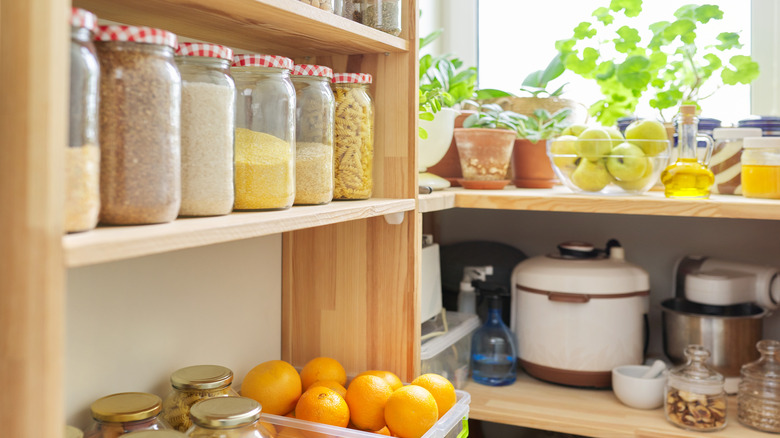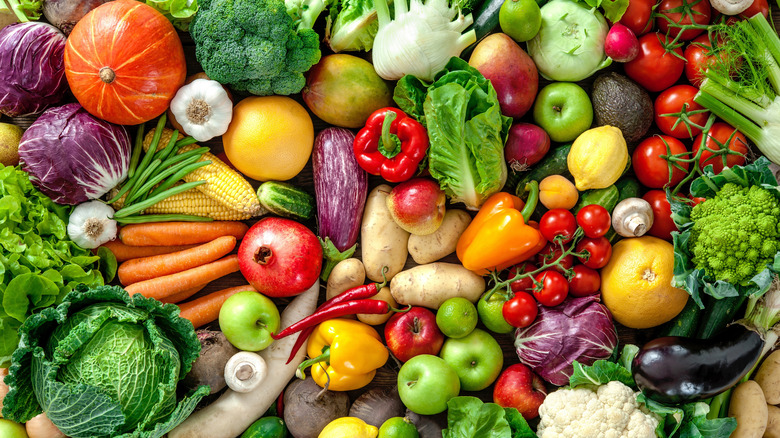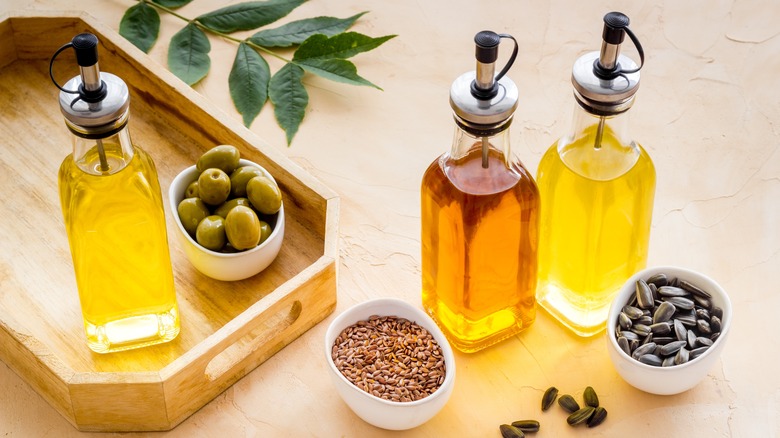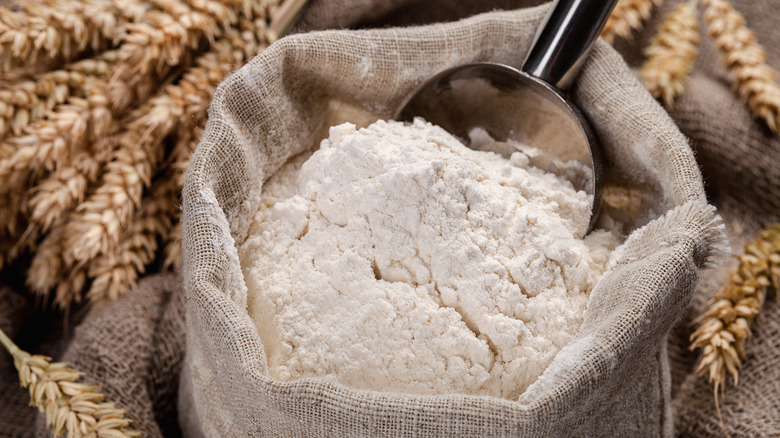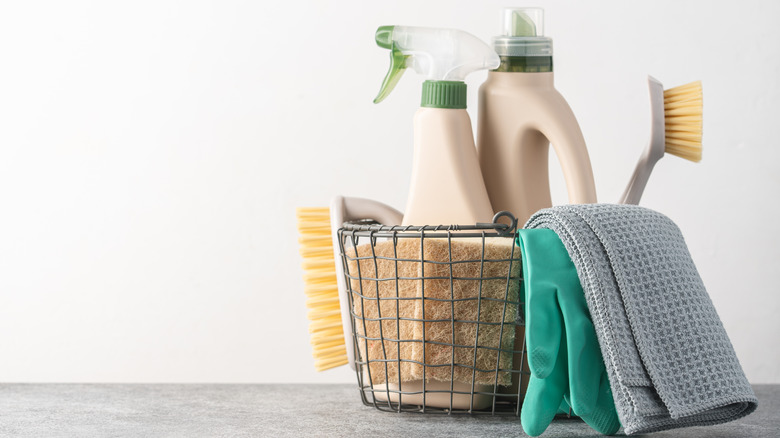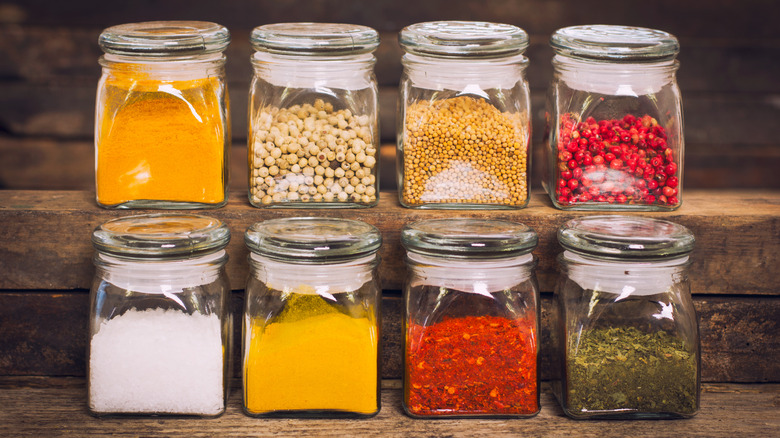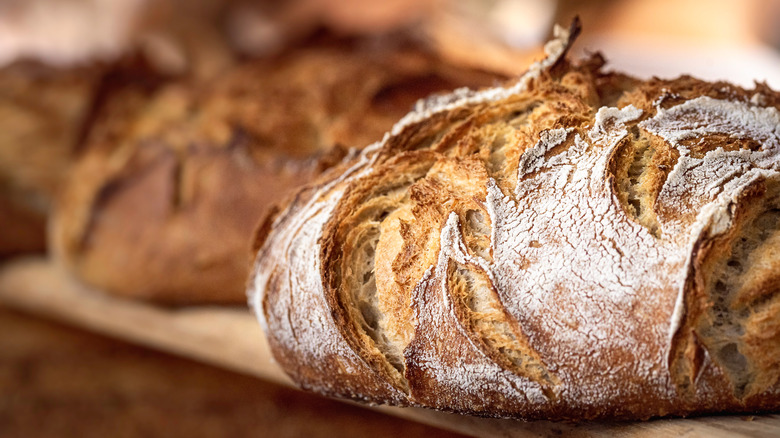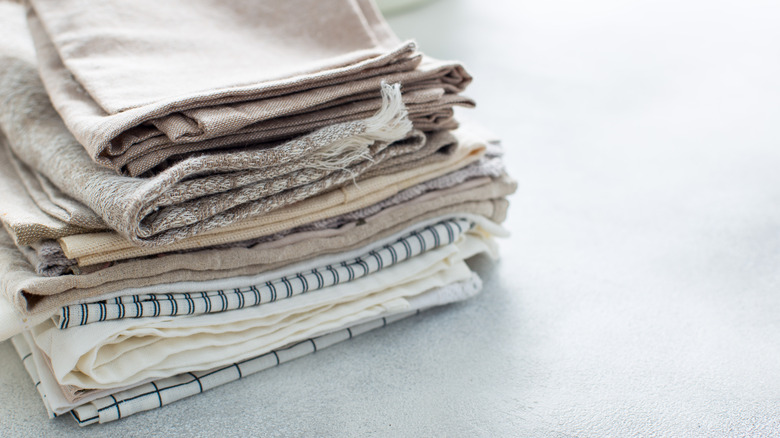8 Things Your Should Almost Never Store In Your Pantry
Your pantry is a convenient storage area that can make your kitchen more functional. It serves as a central location for organizing and storing non-perishable foods such as canned goods, pasta, rice, and condiments. It's also a convenient place to store cooking supplies like baking pans and appliances. Having these items organized and well-stocked makes meal preparation more efficient, saves time and money, and reduces food waste.
But it is important to keep certain things in other storage spots to maintain a clean, organized, and safe environment. Perishable items that aren't shelf-stable should never be stored in the pantry. This can lead to spoilage, bacterial growth, and potential foodborne illnesses. There are also non-food items that should never have a home in your pantry for safety reasons. What are a few other items should you keep out? Here's a comprehensive list of pantry no-nos as well as alternative methods for storing them.
1. Fresh fruits and vegetables
Fruits and vegetables are a vital component of your daily diet, but many people don't know how to store them. One common mistake is putting certain ones in your pantry. A lot of produce needs a very cool environment to maintain freshness and flavor. Fresh items like corn on the cob, cantaloupe, and citrus fruits will last longer when stored in the refrigerator.
It's true that there are a number of fruits and vegetables that can be stored at room temperature. However, ones that release ethylene gas can cause neighboring produce to spoil faster. This effect is amplified in closed spaces like a pantry. These items, like tomatoes, apples, and avocados should be stored on the kitchen counter far apart from ethylene-sensitive foods like bananas and watermelon.
Other foods, like onions and garlic, need a cool, dark environment like a pantry to stay fresh. However, think twice before filling your pantry shelves with them. These both have pretty intense smells and flavors that can transfer to foods around them. So, give them their own cabinet to avoid altering the taste of your other pantry items.
2. Oils with a short shelf life
Oils are a crucial ingredient in cooking and baking and are used in a wide range of recipes to enhance the flavor and texture of dishes. While the pantry may seem like a smart place to store them, certain types of oils are more susceptible to oxidation and rancidity. This can give them an unpleasant taste and smell, not to mention cause long-term health issues.
The types of fat in oils determine how shelf-stable they are. Peanut, avocado, or coconut oil will do just fine being stored at room temperature like in the pantry. However, the best storage spot for a common staple might surprise you. If your kitchen is typically hot, olive oil is actually better off stored in the fridge. This is especially true if you take a while to use a bottle. Flavorful walnut and sesame oils should also be kept chilled to avoid degradation.
3. Unsealed bags of flour
Flour is a common ingredient in many recipes and it's essential to store it properly to ensure its freshness and quality. One common mistake people make is keeping unsealed bags of flour in the pantry. Flour is a hygroscopic substance, meaning it absorbs moisture from the air, making it a potential breeding ground for mold. According to Healthline, if you eat moldy flour, you can experience digestive issues like vomiting and diarrhea.
Storing flour properly is a must, especially if you don't use it up quickly. Rather than storing open bags of flour in the pantry, transfer them into an airtight container, like a plastic or glass jar, with tight-fitting lids. Then, put it in the refrigerator to prolong its lifespan and keep mold from growing. But be mindful that this can affect the leavening process of baked goods. So, just set out the amount you need about an hour before baking to bring it to room temperature.
4. Cleaning supplies and other household chemicals
While cleaning supplies are vital for keeping your home clean, it's important to properly store them to avoid accidents or health hazards. The pantry is not the ideal place for storing cleaning supplies and other household chemicals like paint, wood polish, and more. According to State Food Safety, the fumes and vapors from these products can contaminate food and drinks, making them unsafe for consumption. You should also wash your hands after handling chemicals before touching food or other surfaces in your home to avoid cross-contamination.
Your best alternative to storing cleaning supplies and other chemicals is in a separate, well-ventilated storage area away from food. This can be a spare closet, garage, or utility room. Additionally, you can store cleaning supplies under your bathroom sink using organizing tools like Lazy Susans or baskets for ease of use. Make sure the storage area is secure and inaccessible to children and pets and that the products are stored in their original containers with labels intact.
5. Expired food and spices
To keep a well-stocked and organized pantry, a good habit to start is checking for expired foods and spices at least once a week or every other week. The U.S. Department of Agriculture reports that while "Sell By" and "Use By" dates don't necessarily project the exact time the type of food will expire, it's still best to take them into consideration before using. Luckily, there are other ways you can tell when certain food has gone bad, especially if the expiration date has faded beyond recognition. Food that has spoiled will give off an odor or its texture will be different. If you notice that, then definitely toss the food in question.
According to Insider, some expired foods can start growing bacteria and toxins that you cannot see. Ingesting these can lead to potentially dangerous health concerns like food poisoning and kidney damage. That's why it's always best to smell and examine expired food before using it. To avoid throwing away a ton of old food, consider buying the smallest option, especially if it's something you don't eat that often. Then, when restocking your pantry, use a rotation system by moving the oldest foods and spices to the front and newer ones to the back.
6. Bread or baked goods
Storing bread and baked goods in the pantry may seem like a convenient solution, but it can actually lead to spoilage and loss of freshness. Bread and baked goods, when stored poorly, became stale, moldy, and even attract insects. To ensure you avoid food waste, buy only the amount you need and store them in a visible basket on the kitchen counter or on a table as a reminder.
Another good place to store bread and baked goods is the fridge. This slows down the growth of bacteria and mold, keeping them fresher for longer. Be aware, though, that refrigerated bread can become dry and lose its texture. It's recommended to store bread in the fridge for no more than a week or two. If you want to keep bread for a longer period of time, the freezer is better. Freezing bread preserves its freshness and texture for up to three months.
7. Prescriptions and other medicine
Exposing medication to high temperatures, humidity, and light causes it to lose its effectiveness and potency. That's why you shouldn't store medication in your bathroom, despite the medicine cabinet being a popular place. Another common space for storing medication is the pantry, but even that isn't a good idea. Mainly because it's too accessible to children and pets, which can lead to accidental ingestion. Instead, you want to store medication in a safe and secure location.
The best place is your bedroom, primarily your closet. Medication survives best in cool, dry, and dark areas, so another great option is a dresser drawer. Keeping medicine in your bedroom also makes it easily accessible when needed, though you'll want to ensure it's secure. Consider storing medication in a basket and placing it on a high closet shelf. You can also purchase a small safe and keep it locked in your bedroom nightstand. Obviously, keep the key somewhere only an adult reach. This protects medication from children and retains its potency.
8. Dish towels
Storing dish towels in the pantry seems like the most plausible spot, but it can lead to several issues. Dish towels that are dirty and moldy can attract insects like moths, which can wreak havoc on the food you have stored there. This is especially true if you store towels that are not fully dry in the pantry. Bacteria can also grow on towels which can then spread to other surfaces and food items. This can also lead to an unpleasant odor in the pantry.
Instead of storing dish towels in the pantry, keep them in a dry, cool drawer, but only after they've fully dried. You can also hang them from a display rack that you can get really creative with. Install a small peg board or use antique hooks that match the style of your kitchen. This helps keep them clean, dry, and reduces the risk of cross-contamination from food and other kitchen surfaces.
